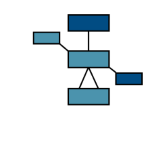Описание
Using Semanta Modeler gives you a great (database) modeling solution based on the concepts of semantic modeling. Data models created in Semanta Modeler are far more readable than data models drawn with ER based tools.
Having years of experience in designing database models, we know that a lot of databases don't even have an ER model, and even when there are, they are very difficult to understand in a short time. ER models have to be studied very, very hard to understand them. When drawing the database model in Semanta Modeler you will be able to understand it very quickly. Or even better: recognize its design flaws and get to a better design.
Semanta Modeler has been built from our years of experience in designing databases (both relational and non-relational). It is primarily aimed at modeling (relational-) databases, though the same concept can be used to build models of data structures of any kind (internal class models, system components or non-IT structures like organization hierarchies).
To aid you in development of relational databases, it brings you powerful tools to translate the semantic model to the target database:
- A powerful SQL database script generator to create your database from scratch or migrate your database between model versions. The script generator supports the industry standards in databases like Oracle and Microsoft SQL server. In addition, it comes with support for MySQL, PostgreSQL and Interbase.
-Reverse engineer an existing relational database into a Semantic model.
- Close interaction with development tools like Microsoft EntityFramework: it will generate the C# (Code First) classes required for the designed database, using all available metadata from the designed model. The resulting classes will be far more friendly to use when compared to using Database first in Visual Studio (import EDMX).
The Semantic modeling techniques have been development (and promoted) by dr.ir. J.H. (Johan) ter Bekke at the technical university in Delft, the Netherlands. He developed a prototype of a true Semantic database known as Xplain.


